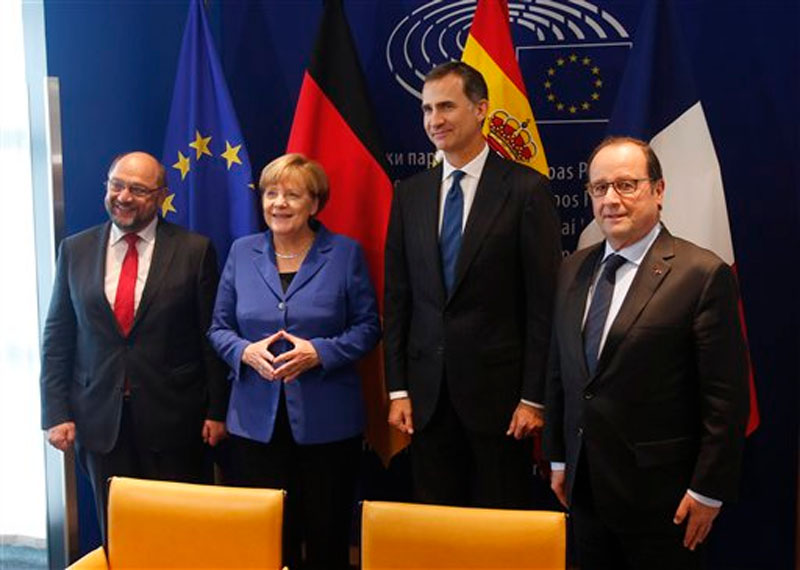Germany and France try to turn tide of European skepticism
STRASBOURG, FRANCE: German Chancellor Angela Merkel and French President Francois Hollande urged European lawmakers on Wednesday to pull together as multiple crises close in, a highly unusual bid to heal divisions within the European Union caused by the influx of refugees, debt crises and encroaching nationalist sentiment.
The separate addresses to the European Parliament in Strasbourg by the most powerful proponents of European unity underscored the risks now besetting the EU's 28 nations.
"The debate is not about less Europe or more Europe," Hollande told lawmakers, evoking the question of national sovereignty besetting member nations. "It is about the affirmation of Europe or the end of Europe. Yes, the end of Europe."
A strong Europe is the only way to guarantee security, Hollande said as he pressed for a strengthened eurozone, a stronger border control system among the border-free Schengen countries and a common asylum system for refugees within the EU.
Merkel told European lawmakers that Europe faces "a test of historic dimensions." She urged "a determined contribution by Europe to resolving these crises."
Merkel, who has come forward as the champion of refugees flowing into Europe, said overcoming the refugee crisis together is a key challenge for the European Union.
"It is precisely now," she said, "that we need more Europe ... If we overcome that, we will be stronger after the crisis than before."
The conservative German Chancellor and the Socialist French president have developed a strong personal relationship.
Both leaders said the EU must direct its foreign and development policy more squarely toward resolving conflicts and combating causes that push people to flee their countries, and invest more funds to do so.
Germany has struggled to get other EU countries to share the burden of hosting refugees. Merkel said: "In the refugee crisis, we must not succumb to the temptation of falling back into national action. Quite the contrary."
It was the first such joint appearance in Strasbourg since 1989, when West German Chancellor Helmut Kohl and French President Francois Mitterrand spoke days after the fall of the Berlin Wall.
The European Union was conceived to end centuries of war through open trade and increased prosperity, and it's also been a way for Europe to stay globally relevant. Germany and France have played a leading role to keep the 28-nation bloc united despite major differences of views among European leaders.
Since 2014, the EU has faced the Ukrainian conflict at its eastern border, Greece's resurgent debt crisis, terrorist attacks in Paris and Brussels, threats that Britain could leave the EU, and the biggest wave of migrant arrivals since World War II.
Elections for European parliamentarians last year produced a rise of populist and far-right parties, including members of neo-Nazi movements in Germany and Greece.
The two leaders' effort to rescue Europe offers a prime opportunity for critics to assail them for pulling the EU ever closer together — especially from Marine Le Pen, a French presidential hopeful with strong anti-immigrant views who was to take the floor as head of a new group in Parliament for far-right politicians.
"This is a historic visit for historically difficult times. The European union is facing immense challenges and requires strong commitment by its leaders," European Parliament president Martin Schulz said when he announced the visit.
King Felipe VI of Spain also came to the defense of Europe, saying in an address that "we all face the passionate challenge to construct a renewed Europe for new times in a world that is certainly different.
"There is no alternative to a united Europe. Let us have confidence in Europe. Let us have confidence in ourselves, the Europeans," he said. The 47-year-old king spoke almost 30 years after Spain's accession to the EU — and as his own country faces a rising independence movement in Catalonia.






